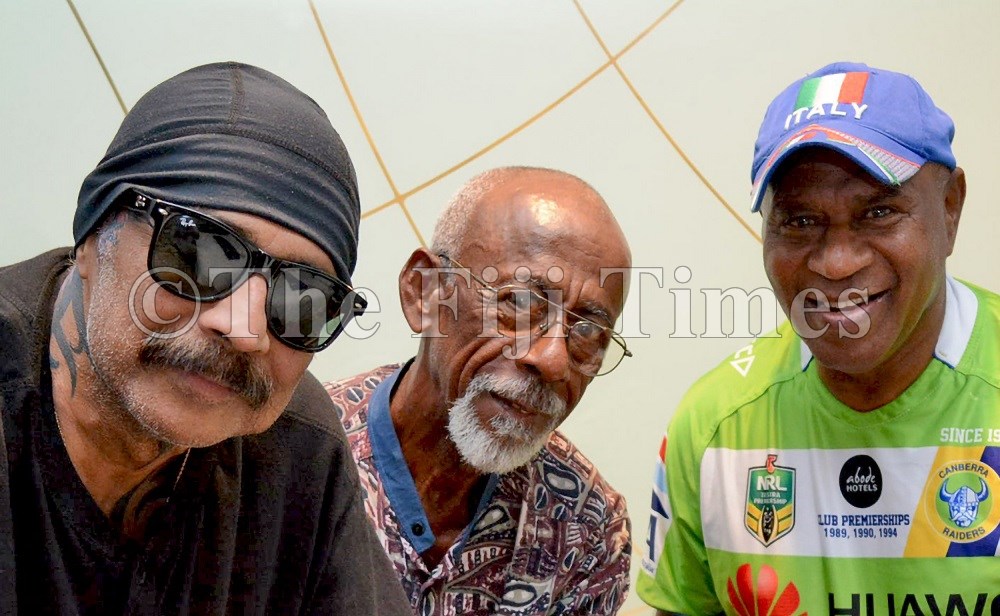RODWELL Rd, Suva today is a far cry from the raging entertainment strip it once was.
Back in the ’70s and ’80s, the Walu Bay end of the thoroughfare was home to the Phoenix Theatre — one of the busiest cinemas in the country and home to numerous talent shows and competitions.
It was also where the St John’s Hall was situated — the site of many live music events.
But Baby Boomers and Generation X would also remember the Bali Hai nightclub and the band that performed there.
Maxie’s Mules, led by guitarist Maxie Columbus also featured the talent of Michael Wong on drums, Bose on bass guitar and the raspy tone of Manoa Sugutanaivalu on lead vocals.
While the rest of the Capital City was focused on disco, rhythm and blues and funk, Maxie and his boys belted out nothing but straight-ahead rock — delivering their versions of Deep Purple, Eric Clapton and Jimmy Hendrix tunes.
The evenings at the Bali Hai would begin with island instrumentals before venturing into the blues and build up to the hard rock songs the group was renowned for.
And Suva City live music lovers during the ’70s and ’80s era had a smorgasbord of genres to sample.
The Victoria Pde end of the Capital City was where the jazz and Latin appreciators gathered, at places like Traps and the then Suva Travelodge Hotel (now Holiday Inn).
A few minutes’ walk away was the Golden Dragon — home to the inimitable Dragon Swingers.
This was where musicians cut their teeth and it was the birthplace of greats like Tom Mawi, Wise Vatuwaqa, Marika Gata, Sakiusa Bulicokocoko, Erone Paspatu and many others.
Ulysses, one of Fiji’s most progressive musical groups, had a long residency at Lucky Eddies (now Suva Business Centre).
Ulysses began playing rock and folk songs but adapted to the changing tastes of nightclub patrons and evolved their repertoire as the scene shifted towards commercial dance music.
The only act that remained committed to hard rock was Maxie’s Mules.
A rigorous practice schedule combined with top-notch music gear resulted in the band achieving cult-like status in the Suva circuit.
And the band drew all sorts to the Bali Hai — sophisticated business types keen to soak in the hard-hitting beats of rock on one end of the scale, and fishermen from Taiwanese vessels berthed at Walu Bay seeking solace after months at sea on the other.
Maxie said in the middle there were the locals, digging the hard rock sounds but also ready to take disagreements forged inside the nightclub out on to the streets.
“At times the action used to end up at the gas station next to the club and also the Phoenix Theatre and across the street to St John’s Hall,” he said.
“The fights used to be army against police, Delainavesi against Raiwaqa gang, the Green Army from Suvavou Village, the gang from Nabua and Turaki.
“The bouncers couldn’t do anything about it.
“Good thing we had our own bouncer on stage in Simione Kuruvoli.”
Kuruvoli would later take his place in the Mules after long time drummer Michael Wong departed the group. Kuruvoli, a national representative in judo began training for the 1975 South Pacific Games in Guam, Matereti Sarasau took over as drummer.
“Suva was a different place back then, yes, there were fights inside and outside the Bali Hai but nothing could beat the music scene in the ’70s and ’80s.
“You could feel it in the air, as soon as the sun began to go down, people would begin moving around to their favourite drinking spots to wind down after a hard day at work.
“There was a lot of excitement in the air because of the kind of music that we used to play back then. “The Battle of the Bands was something else.
“For one whole month, bands would go up against each other to find out who was the best in Fiji.
“This was one of the reasons musicians really developed very quickly.
“People were practising and improving all the time.
“When Maxie’s Mules won the competition in 1971, they brought a lot of attention to the Bali Hai.
“We noticed different types of people came into the club after that.






